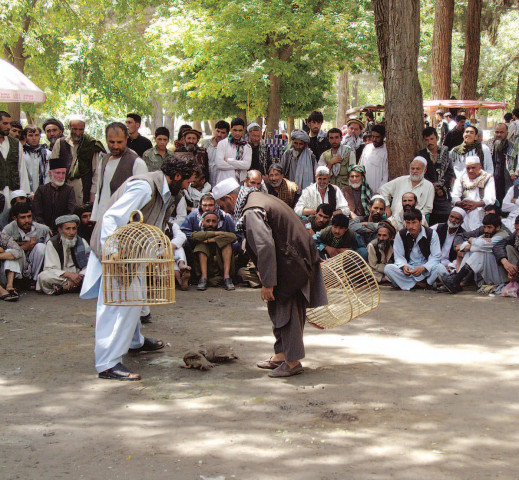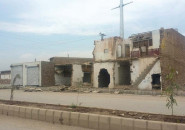If you are drinking tea, then bring some for me also
A Jewish journalist discovers that tea, humour and denial are universal commodities.

These men were refugees who lived much of their lives in Pakistan and now huddled together in a small commune to do construction work in (relatively) peaceful Bamiyan. They were building a midwife training centre. Naeem was tall and handsome, clean-shaven but for a light goatee, and had the kind of face that could place him anywhere — I hadn’t noticed an accent after a handful of words of introduction and suspected, in a flash of conspiracy, that he was another undercover American hiding in Afghan clothes. I tried to think of a hand sign only Americans would know, a secret Westerners’ Salute, but a scan of my mental Walker, Texas Ranger database turned up nothing. I tried another crafty tactic: “So, where are you from?”
“Kabul,” he said.
Of course, I hadn’t been hiding anything either — they knew where I was from and what I was (or wasn’t) doing in Afghanistan. I didn’t look like their stock photo of “English” — their usual bracket for all native English speakers. Naaem described this character, one that would arouse the wrong kind of curiosity on the road from the capital: “Big, big body... big and fat... and white. Blue eyes or green eyes — red faces.” Anything but a superfecta of these qualities and a refusal to dress locally will earn you safe passage to Bamiyan.
Naeem translated for many but spoke for most, and someone turned off the television for us to question each other further rather than listen to mostly dispiriting Urdu news filtered through static. “Tonight you will be with us,” he told me in much the same way as a Roman orator reads a state proclamation, or an oracle relates a prophecy. Hospitality is never in question in the Bamiyan Valley. If there is a guest, there is a meal, there is a bed, there is every frill the hosts have denied themselves. “We will bring you something special that you’ll like,” Naeem said. “Wine, or something like this?” I never asked if they had access to alcohol, or if they would even drink it, but I certainly didn’t want to find out by sending them on a dangerous Grey Goose chase to find liquor for the American. Here, an offer implies no possession, it merely evinces the willingness to give. I never once questioned that willingness — I knew they would have chased geese for me all night just to say welcome.
We became simpler people. The man with an angular face and ebullient blue eyes, who had met me outside, who had saved me from a pack of excited children with stones in their hands, spoke in a quiet voice. “Take tea?” His name was Osama Latif (the guys smirked, “pay attention to the ‘Latif’!”) I mispronounced a phrase my Pashtun tailor friends had taught me in Abu Dhabi for just such an occasion: “Kataso skay, bya malahum raorey.” If you are drinking tea, then bring some for me also.
For an hour we talked about each other. I looked for information with stealthless drones (“Is there any cultural difference between Afghan and Pakistani Pashtuns?” Answer: “No.”) They took a very different approach, prizing my character from the looks on my face, they way I sat, the way I moved. They found information in the way I reported the opinions of my compatriots, with my tone, perhaps, as the only gauge of my consent: “What do American people think about the Taliban?”
However much silence there had been previously, now there was more. Men shifted on the mattresses and leaned in from the walls. I summoned every ounce of diplomatic vagueness and gratuitous jargon that pulled me through college political science papers. “The Taliban supports a way of doing something that allows for methods that are inhumane...” I said haltingly. No one spoke. These men were no supporters of the Taliban, having lived in refugee camps during their rule, and with their livelihood dependent on the protection of this ethnically distinct and politically advanced province from militant onslaught. But in terms of ethnicity, as Pashtuns in Afghanistan, these men fell into the group the Taliban claimed to represent. So I put up one line of editorial defence, leaving “things I think” for “things I noticed”: “Afghans that are Persian think it’s the Pashtun (who are the Taliban) — they’re afraid.”
Naeem was nodding. “Persian people think Pashtuns are the Taliban. Here I’m Pashtun and I’m scared of the Taliban.” This was the constant paradox of their lives: every vestige of Pashtun culture — clothes, facial hair, language, skin colour, the nationality of their passport — these separated them from their Western-contracting colleagues. So what they could change they did within reason, but beardless and Pashtun, they became typical subjects for Taliban interrogation.
“That is not Pashtun,” said Osama Latif, denouncing extremism. In his mind, he belonged to an ethnic group defined not only by common language; his group was founded on ethics, too. Just as any American loyalist might condemn with the word ‘un-American’, Osama Latif repudiated the Taliban for their rejection of those basic truths. He went further, describing the militants’ real common trait: “Same cap and hat, now we’re Taliban’,” he mocked. “When he goes on vacation, he goes to Pakistan.” I put aside making jokes about what a Taliban vacation would be like to listen to his underlying message: we deny their ethnicity, and we can deny their nationality — they have only their hats. To be Afghan is a privilege that can be rescinded. By this process, the men in this room had ostracised terrorists to the brink of humanity, stripping them of the most elemental facts of their identity.
Of course, in doing so they tended to overstate the role of foreigners. It is true that volunteers may be Chechen or Arab or Pakistani, but Osama Latif and the others were making a different point: they are not us, so they must be something else.
J’accuse! I have found this logic in every region where daily life is affected by terrorism. Here in Afghanistan, they put the blame on ‘Pakistan’. In Lahore, two men told me the terrorists were coming from India. In northern India, I’m sure, they will say extremists come from the south. In the south, they undoubtedly come from Sri Lanka. And if Sri Lanka ever faces another terrorist threat, they may well accuse evil creatures that rise from the sea to tyrannise the innocent and go bump in the night.
Humour, it seems, is one commodity that has survived the ravages of war in Afghanistan. I asked to video them recounting jokes in Pashto, and though first enthusiastic, they turned fearful. They reckoned that if I were ever in danger, if the American government were to be looking for me, they would find records of these particular men... joking. (Earlier Naeem had excitedly run in with knives when I asked if we could pose for a picture with them pretending to kidnap me. The others convinced us it was a bad idea.) It didn’t worry me that they had implied the possibility of my abduction (you can’t land in Afghanistan without first imagining and rebuffing worst case scenarios), but I noticed again how powerful humour could be. Not much is in a name, Ms Capulet — until you say it in a silly voice.
That night we ate thick beans and yellow rice with the warm Afghan bread that is baked flat, punctured with hundreds of ornamental holes. A much older man with a grey beard down to his breastbone joined us on the floor. “The leader,” Naeem stated proudly. The man finished eating and turned up the volume on the news; tanks rolled around somewhere in the north, no reports of violence from the south. Naeem wiped his fingers on the bread. “You’re Muslim?” he asked.
“Jewish.”
“What?”
“I’m Jewish.”
I saw no trace of malice in his eyes, but realised that I had steered him into uncharted waters — he was perfectly unaware of the close kinship of our traditions. “We did chapter one,” I said. “Christianity is chapter two. The Qur’an is chapter three — it’s all the same story.” It wasn’t the most eloquent exegesis of Abrahamic scripture, but it felt like a start; I wanted only to avoid presenting my traditions as somehow more valid. “Honestly, I don’t really believe any of it,” I shrugged happily.
I mentioned Adam and Abraham, Ibrahim, and won brief nods from the crowd. The man from Kandahar agreed with every word and told me so in Arabic. We hadn’t gotten terribly far in our conversation, but we had opened the forum — and with that, the call to prayer sounded and the men dispersed to perform their ablutions.
Naeem is a 24-year-old engineer with a degree in road civil engineering from Polytechnical University of Kabul. I know this because we are now friends on Facebook. It seems things are still well in Bamiyan.
Published in The Express Tribune, Sunday Magazine, September 4th, 2011.


















COMMENTS
Comments are moderated and generally will be posted if they are on-topic and not abusive.
For more information, please see our Comments FAQ